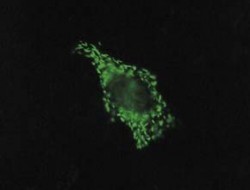Rychlý rozvoj rostlinných biotechnologií umožnil přípravu rekombinantních molekul - xenogenních (cizorodých) proteinů, které lze využít pro přípravu protilátek a jedlých vakcín v rostlinách ve velkých množstvích a za poměrně nízkou cenu. Existují dva přístupy - genetická transformace rostlinného genomu nebo užití rostlinných virových vektorů nesoucích gen kódující cizí protein (virus není součástí genomu rostliny a nepřechází do dalších generací).
The rapid development of plant biotechnology has allowed for the preparation of re-combined molecules - xenobiotic proteins, which can be used for the preparation of antibodies and edible vaccines in plants in great quantities and in a relatively inexpensive manner. Two different approaches exist: genetic transformation of the plant genome or use of plant virus vectors containing gene coding guest protein (the virus is not a part of the plant genome and it is not transferable to other generations).
 Imunofluorescenční detekce produkce kapsidového proteinu A viru bramboru nesoucího epitop z L2 proteinu lidského papillomaviru v savčích buňkách. Foto D. Pokorná
Imunofluorescenční detekce produkce kapsidového proteinu A viru bramboru nesoucího epitop z L2 proteinu lidského papillomaviru v savčích buňkách. Foto D. Pokorná

